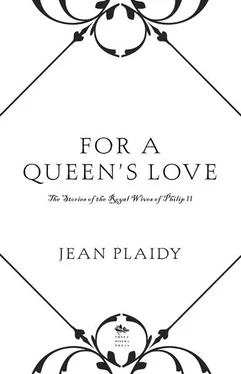Jean Plaidy - For a Queen's Love - The Stories of the Royal Wives of Philip II
Здесь есть возможность читать онлайн «Jean Plaidy - For a Queen's Love - The Stories of the Royal Wives of Philip II» весь текст электронной книги совершенно бесплатно (целиком полную версию без сокращений). В некоторых случаях можно слушать аудио, скачать через торрент в формате fb2 и присутствует краткое содержание. Жанр: Старинная литература, на русском языке. Описание произведения, (предисловие) а так же отзывы посетителей доступны на портале библиотеки ЛибКат.
- Название:For a Queen's Love: The Stories of the Royal Wives of Philip II
- Автор:
- Жанр:
- Год:неизвестен
- ISBN:нет данных
- Рейтинг книги:5 / 5. Голосов: 1
-
Избранное:Добавить в избранное
- Отзывы:
-
Ваша оценка:
- 100
- 1
- 2
- 3
- 4
- 5
For a Queen's Love: The Stories of the Royal Wives of Philip II: краткое содержание, описание и аннотация
Предлагаем к чтению аннотацию, описание, краткое содержание или предисловие (зависит от того, что написал сам автор книги «For a Queen's Love: The Stories of the Royal Wives of Philip II»). Если вы не нашли необходимую информацию о книге — напишите в комментариях, мы постараемся отыскать её.
For a Queen's Love: The Stories of the Royal Wives of Philip II — читать онлайн бесплатно полную книгу (весь текст) целиком
Ниже представлен текст книги, разбитый по страницам. Система сохранения места последней прочитанной страницы, позволяет с удобством читать онлайн бесплатно книгу «For a Queen's Love: The Stories of the Royal Wives of Philip II», без необходимости каждый раз заново искать на чём Вы остановились. Поставьте закладку, и сможете в любой момент перейти на страницу, на которой закончили чтение.
Интервал:
Закладка:
“If they had turned into a river,” said the grave little Prince, “that would have been better. For what good are the boulders but to make the way more difficult?”
Ruy burst out laughing, but he did not tell Philip why he laughed. Philip wondered whether to command him to tell, but though he was a prince, he knew the etiquette between friends. Even a Prince could not command a friend.
“It may be, Highness,” went on Ruy, “that Christ did not pass this way, for surely if He had, He would not have added to the difficulties of this land.”
“We will pray for a miracle,” said Philip. “It would be good to turn the boulders into water. Perhaps my father could do it.”
Sometimes they talked of the Cid. Philip had not heard of that hero before; there had only been one hero in his life: his father.
“What!” cried Ruy. “Your Highness does not know of the Cid!” The black eyes gleamed. If the Emperor was a hero to his son, the Cid was an even greater hero to Ruy.
Ruy smiled and said: “We have the same name. He was Ruy Diaz de Bivar, el mio Cid Campeador . His real name was Rodrigo but he was called Ruy … as I am. And ‘Cid,’ that is an Arabic name which means Lord—the Champion Lord. He freed Spain from the Infidel.”
Philip’s brow was puckered. “My great-grandfather and my great-grandmother did that,” he said haughtily.
“Indeed yes,” said Ruy hastily. “But the Cid was the first to rise against them with any success. He lived long ago … long before great Ferdinand and Isabella.”
“How long before?”
“Hundreds of years … two hundred at least; and there was fighting all that time; and when your great-grandfather and your great-grandmother married they united Castile and Aragon; and that was the beginning of good times for our country.”
That was better. That was history as Philip knew it. But Ruy had many tales to tell of the Cid. He told of the hero’s love for the beautiful Doña Ximena, and how the Cid had had to fight a duel for her before he won her; he told of how she loved him and how broken-hearted she was when he must tear himself from her to fight the Infidel. From Ruy, Philip learned her prayer:
“Tu que atodos guias, vala myo Cid el Campeador.”
It was a prayer he might well say for his father. “Thou, who guardest all men, guard my lord and champion.” But his father did not need such prayers, since even the Cid could not have been so important in the eyes of God as the Emperor Charles.
Now Ruy was telling him of the Cid’s cleverness, how, wishing to raise money to pay his soldiers, he, with the help of his squire, filled coffers with sand and nails; these he showed to the Jews, telling them that they contained treasures he had won from the Moors, and proffered them as security for a loan. The Prince listened gravely. It seemed to him that sand and nails could not be worth very much, but he did not say so, as Maria would have done; he remained silent, waiting.
And the foolish Jews lent the money without opening the coffers which were heavily sealed. They dared not open them, for they knew that the Cid would be angry if they doubted his word. So … he got the money and the Jews got the coffers full of worthless sand and nails.
Philip had to question this. He cried: “But … how could the Cid keep the money when he had given nothing for it?”
“He rode away with their money, and it was too late to do anything about that when the coffers were opened.”
“But that is stealing,” pronounced the Prince. “And it is forbidden to steal.”
The merry black eyes were opened very wide. “I see I forgot to explain to your Highness. These were Jews … and Jews are infidels.”
“They are … heretics?” said Philip uncertainly.
“Infidels and heretics, your Highness … one and the same. Burn them all … torture them and send them to the flames…. That is the verdict of Holy Church.”
Philip dropped his eyes. All was well. The Cid’s honor was saved. He had stolen; but it was only from Jews.
Yet it did not say in the Scriptures: “Thou shalt not steal … except from Jews, infidels, and heretics.” He wondered why. Perhaps one day he would find out.
Ruy slipped Philip’s shirt over his head. When the little boy was naked he seemed stripped of his dignity. His body was so small and white. He guessed that Ruy’s was big and strong and brown. He felt that he was a very small boy without his clothes.
He said: “I wish that you could help me to dress with my new clothes. I wish I did not have to undress with so many people looking on.”
“That,” said Ruy, “is one of the penalties of being a prince who will one day be a king.”
“But to stand there … naked before them all.”
Ruy laughed his merry laugh. “Think nothing of it, Highness. It is no more than standing before me. There will merely be several hundred pairs of eyes upon you instead of one.”
“But …” began Philip.
“You will not be afraid,” soothed Ruy. “And when you wear the clothes of a man, you will have taken the first step toward becoming a man.”
Philip was silent. He thought of the Cid, fighting for the lady he wished to marry, cheating the Jews with his coffers full of worthless sand. He supposed it was given to some, like the Cid, to do great and glorious deeds, and to others to be quiet and grave and clever enough to hide their fears and their joys, to learn to become, not what they wished to be, but what others had decided they must be.
At last there came that hot day when they set out for the ceremony.
The Queen, with her son and little daughter, rode in state to the Cloister of St. Anne. About them were the soldiers of the King’s Guard, without whom the little Prince was never allowed to travel beyond the palace. The holy monks and nobles made up the procession, and all was pomp and ceremony of the most solemn kind.
Along the route the people had gathered. Philip was aware once more of thousands of eyes upon him. He felt smaller than he did in the privacy of his own apartments; he longed to be grown up, and as tall and strong as Ruy.
But Ruy was riding close to him. That gave him courage. He did not turn his head to look at his friend, but he was aware of him. He recalled his encouraging words: “Do not be afraid. There will be just several hundred pairs of eyes instead of one.”
The procession, this time led by the Queen, had reached the gates of the Cloister. There it halted, and one of the nuns, who had been waiting at the gate, said in a loud voice, which could be heard by the stragglers on the edge of the crowd: “Who would enter in?”
Leonor answered for the Queen. “It is Doña Isabella, Queen and Empress, with her offspring, Philip and Maria.”
The nun immediately made a deep obeisance and signed for the gates to be flung wide open.
How cold it was inside the Cloister! Philip dreaded the moment when he would be stripped of his clothes. If he felt cold he must not give the slightest sign. When he was stripped he must not shiver, for if he did, all would see, and what would they think of the one who was destined to rule them if they looked on a poor, shivering baby?
The Abbess had come forward to greet the Queen, and when the Prince was presented to her, she knelt before him so that her cold gray eyes beneath her hood were level with his.
They went along to the great hall where food was laid out for them, and the Queen sat at the head of the table with Philip on her right hand. Maria, who sat next to Leonor, did not realize the solemnity of the occasion.
“Philip!” she called. “Look at me!”
But he did not look at her. He gave no sign that he had heard her. How could he, heir to half the world, allow himself even to notice the frivolity of a careless child who, it seemed, would never understand Spanish dignity and Spanish solemnity. Leonor was smiling indulgently. They would all be saying: “Ah, but she is a Hapsburg. What can one expect?” Yet why should he not also be a Hapsburg? He had the same father and mother as Maria. But a prince who would one day be a king of Spain must be Spanish in every way. His father was a Hapsburg, but the people of Spain wanted a Spaniard to rule over them. Philip had no choice. He had to be a quiet, solemn little Spaniard. Philip of Spain must be what others wished him to be.
Читать дальшеИнтервал:
Закладка:
Похожие книги на «For a Queen's Love: The Stories of the Royal Wives of Philip II»
Представляем Вашему вниманию похожие книги на «For a Queen's Love: The Stories of the Royal Wives of Philip II» списком для выбора. Мы отобрали схожую по названию и смыслу литературу в надежде предоставить читателям больше вариантов отыскать новые, интересные, ещё непрочитанные произведения.
Обсуждение, отзывы о книге «For a Queen's Love: The Stories of the Royal Wives of Philip II» и просто собственные мнения читателей. Оставьте ваши комментарии, напишите, что Вы думаете о произведении, его смысле или главных героях. Укажите что конкретно понравилось, а что нет, и почему Вы так считаете.












